Bluesfest backlash over lack of women in line-up
An Instagram post has kicked off a lively debate about Bluesfest’s mainly male line-up for 2019.
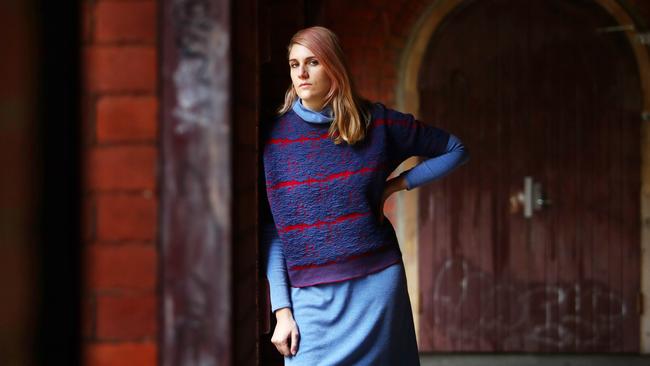
Soon after blues and roots music festival Bluesfest announced the first line-up of artists booked to perform at its 30th anniversary event, an edited version of its poster was published on Instagram.
Rooted in the longstanding musical concept of the remix, wherein the original components of an artwork are reconfigured to produce something fresh, the altered poster was shared by an account whose purpose is succinctly described by its name: @LineupsWithoutMales.
In the case of Bluesfest — which prides itself on being “Australia’s premier music festival”, and will take place across the Easter long weekend near Byron Bay, NSW, next year — the names of American headliners such as Jack Johnson, Ray LaMontagne and Ben Harper and the Innocent Criminals were erased.
The altered poster — whose borders retained the evocative imagery of cockatoos and sunset — positioned country singer-songwriter Kasey Chambers as the mid-poster headliner amid blank space; in the original line-up, Chambers is billed sixth.
Languishing at the bottom of the otherwise empty poster were three more names: I’m With Her, Larkin Poe and Irish Mythen, as well as RocKwiz Live, a stage version of the popular music quiz show hosted by Julia Zemiro. The caption posted by @LineupsWithoutMales contained a few words — “15% of artists feature at least one non-male member” — but the altered poster spoke much louder and had all the subtlety of a heavy metal drum solo.
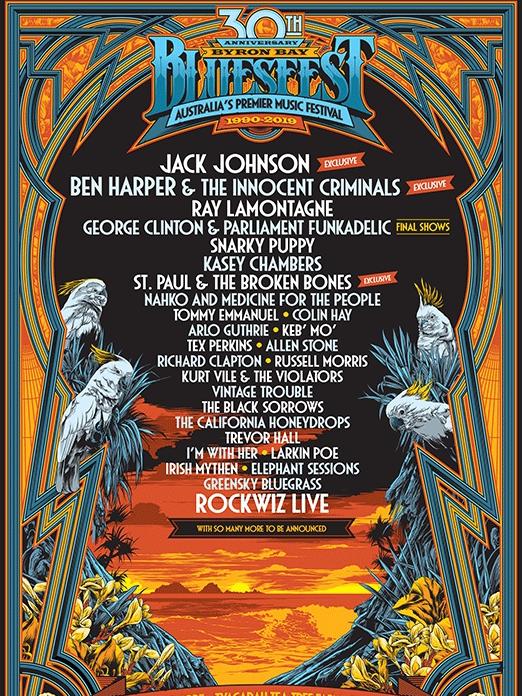
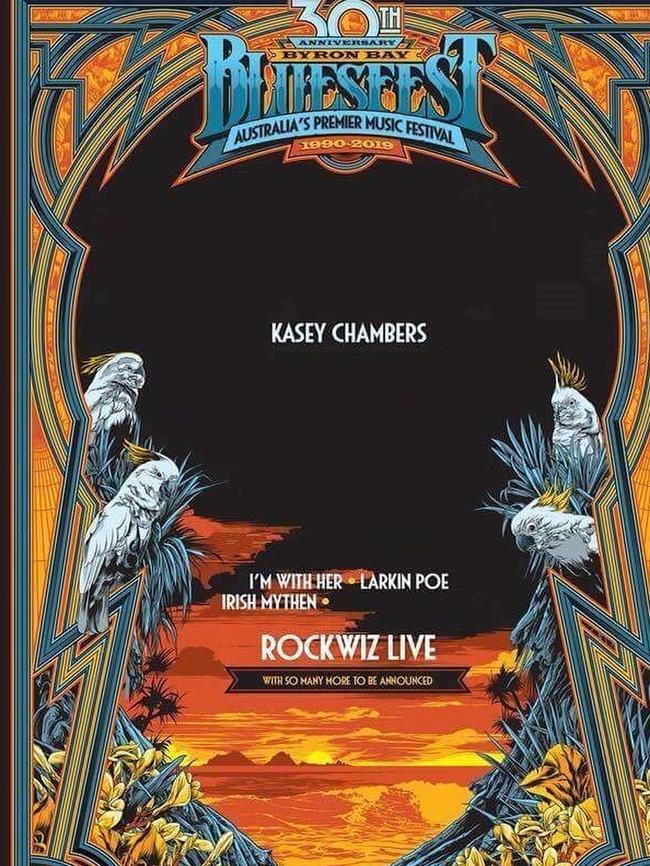
The publication of this image last week turned up the heat on a simmering issue: gender diversity among the acts booked to perform at popular Australian music festivals — and, in some cases, the lack thereof. In March, national youth broadcaster Triple J published a report, By the Numbers 2018, which shows the Australian music industry continues to be dominated by men at almost every level. It notes that none of the nation’s major touring festivals have reached gender parity in their line-ups; the most recent edition of Laneway Festival came closest to parity, with female-identifying acts comprising 44 per cent of artists booked.
In response, Secret Sounds — a company that books Falls Festival and Splendour in the Grass, two of the most popular events on the live music calendar — took issue with the report’s methodology.
“When it comes to festivals, Triple J (judges) female representation on the first line-up announcement poster as the key (criterion),” Secret Sounds wrote. “We don’t agree … That said, we also accept we have more work to do and are far from perfect. We want this conversation to continue. We want things to evolve.”
Within a few days of the first line-up announcement for Bluesfest 2019, the conversation had evolved from simmer to boil-over, with the festival under scrutiny for including so few women.
After sustained public and private criticism, festival director Peter Noble lashed out.
In response to a cheeky query posted on Facebook — “Looks like a sausage fest, where’s the chicks?” — Noble wrote back: “Bet you are an under or unemployed white privileged nobody with too much time on your hands. Going nowhere fast into a life of depression and loneliness due to you having nothing meaningful to justify why you continue to breathe.”
The following day, Noble told the Herald Sun: “After working from 5am to 11.30pm that night I exploded on someone for calling me a sausage festival. I shouldn’t have done it, I will contact that person and apologise.”
This week, speaking to The Australian, Noble assessed the events of the preceding days.
“I think that attacking people, and having a campaign where we’re called a ‘sausage fest’, or where I actually get communications saying, ‘Why don’t you get out of the way, you f..king old man?’ — at some point, I’m not listening to those people any more,” he says.
“So they’re not achieving their goal, which is to engage people like me to be aware, and perhaps try to be an agent of change.
In a long interview, Noble spoke of his decades of booking and mentoring women as well as artists of colour, including his founding of the Boomerang Festival for indigenous music, which is part of Bluesfest each year. He says subsequent line-ups will feature more women and emphasises that he sees potential bookings through the lens of artistic merit rather than any concerns for gender quotas.
“I hope we all get to that point where we’re trying to encourage more women to feel empowered to be involved in the music industry,” Noble says. “I don’t even see myself as a leader. All I am is a guy that left school at the age of 15 to become a musician and, 50 years later, I’m still in the biz. I don’t even think in colours and I don’t think in gender. I just want to work with great people. That’s what I get a buzz out of. It’s not political — it’s the arts.”
One group that attracted Noble’s scorn for challenging Bluesfest last week is called Listen, a volunteer-run organisation that aims to increase awareness around gender politics in Australian music.
It argues that a festival’s first line-up announcement represents significant value by attracting the bulk of ticket sales and setting the tone for what follows.
“We’re aiming to break down this false idea that music is just about talent,” says Elly Scrine, a Melbourne-based musician and one of several Listen directors.
“You can have as much talent in the world, but there are structural inequalities at play here. For example, if you are a wheelchair user, or if you are someone living on the poverty line, or if you are someone who gets told, ‘Well, girls don’t play the drums’ when they’re seven years old, or if you’re experiencing racism, sexual harassment or transphobia in the recording studio, in your band or while you’re performing, these experiences shape your participation.
The music industry isn’t a meritocracy, and it’s a false idea that we’re all on an equal playing field from the start.”
Notable Australian musicians for whom the events of last week became a flashpoint include singer-songwriter Ella Hooper, who wrote on Twitter: “It’s quite gobsmacking. I’ve been asking my agency to get me on Bluesfest for years, but it never flies.” On the same platform, Sydney rock band the Preatures — whose frontwoman is Isabella Manfredi — wrote: “I used to think it was an issue of availability, and sometimes it truthfully is. But there are literally TOO many female artists active and available in Aus right now that would be appropriate for (Bluesfest).”
For an issue whose latest conflagration was lit by a fiery Instagram image, it is fitting that another post on that platform may also contain the spark for a potential solution.
On Tuesday, Sydney singer-songwriter Laura Jean shared the first draft of an idea that seeks to empower artists to raise this subject during early discussions with festival promoters, rather than waiting to see which of their peers appear on the line-up once it is made public. “Dear booking agent or manager,” Jean’s Instagram note begins.
“I am writing to you with an idea that may help festival bookers consider diversity more when they put together their program. In light of the recent (Bluesfest) announcement, we need to stay vigilant in our fight to keep up with other industries in regards to equal opportunity.”
Jean’s idea is to ask a couple of questions alongside the usual negotiations about artist fee and playing time. The questions are these: “Can you please let me know your diversity policy, and how you plan to program an inclusive line-up?”
“The only way we are going to make a lasting change,” she writes, “is for artists and bookers to ask these questions when they are asked to play.
“It reminds well-meaning but perhaps politically unaware festival bookers that this is an issue that is going to affect them, and that artists won’t support line-ups with mainly white men.
“I don’t think it’s necessary to specify a percentage, it will be enough for now to ask the question so bookers are forced to think about it.”

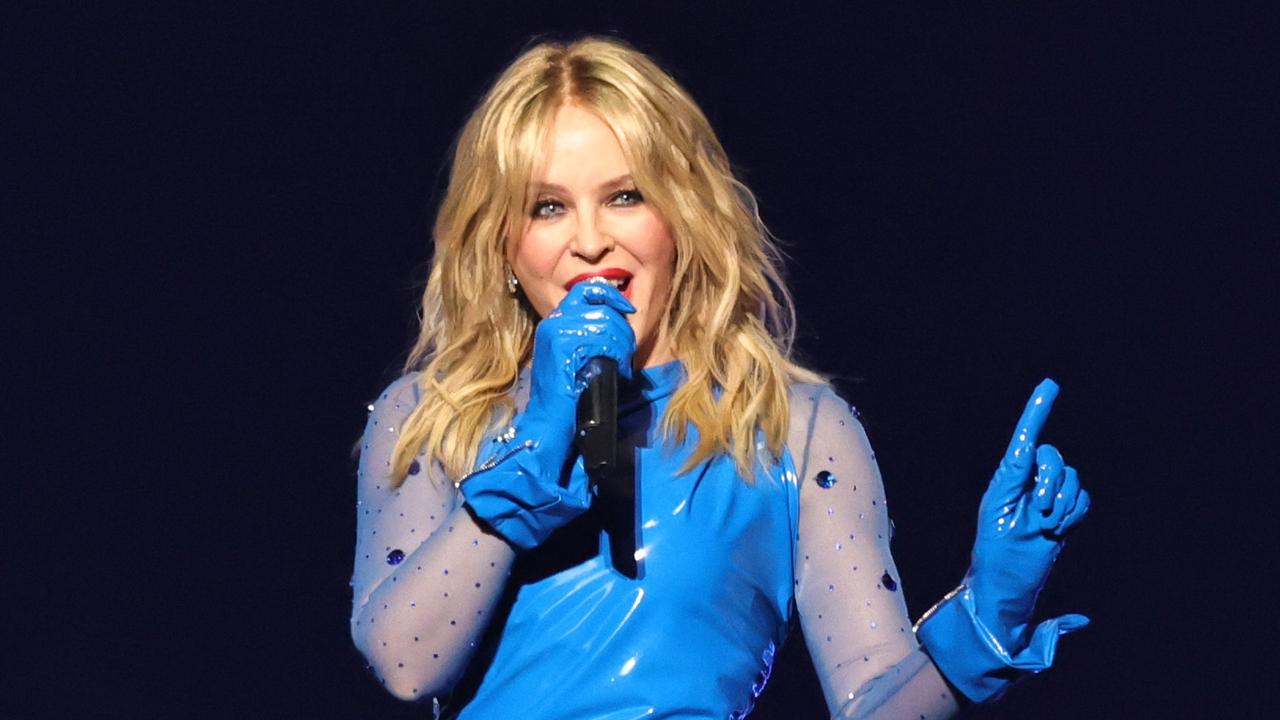
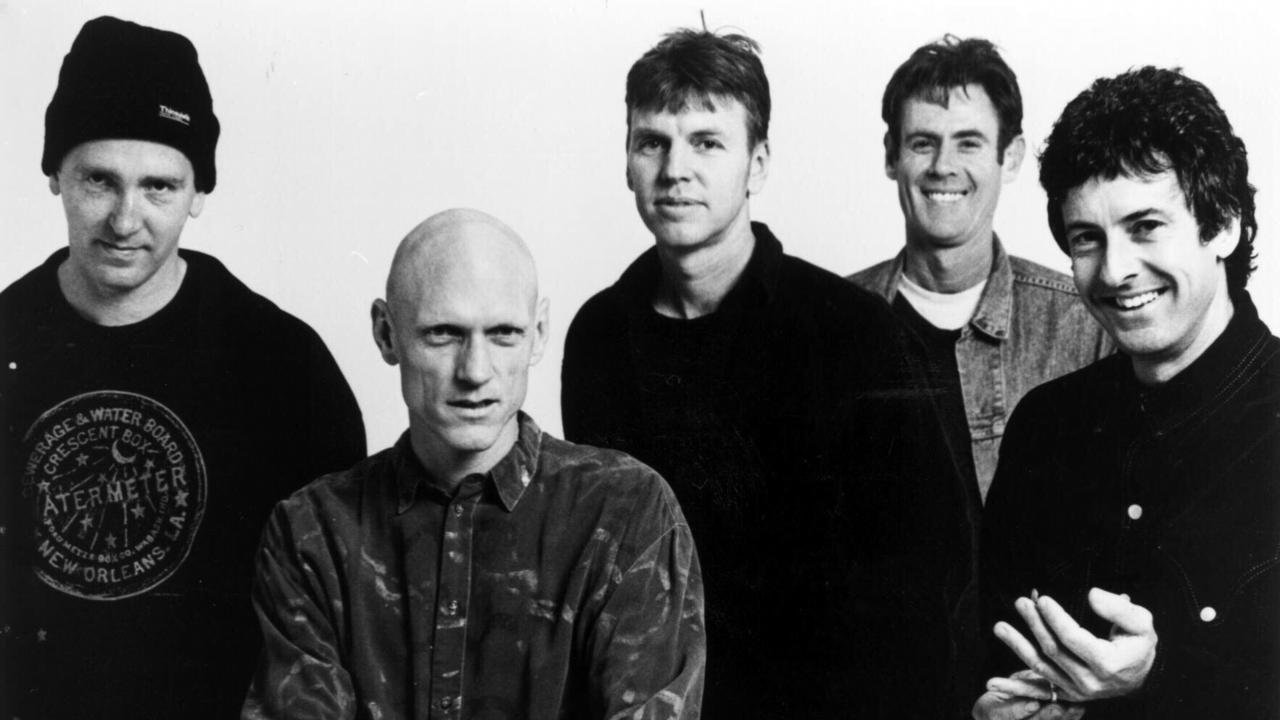
To join the conversation, please log in. Don't have an account? Register
Join the conversation, you are commenting as Logout